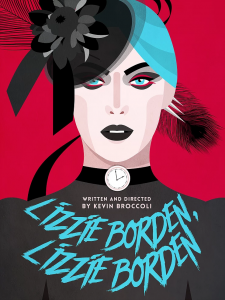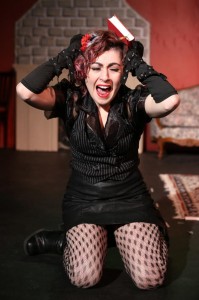
Fictional characters are fictional, which may not seem a profound observation, but real people can be, and to some extent must be, substantially fictional, too, because it is impossible to know them perfectly. Lizzie Borden was unquestionably a real historical figure, found innocent of brutally murdering her father and stepmother with an ax in a sensational trial in 1892, but more than a century later her public image has become almost entirely fictionalized. Ridiculous portrayals of Borden have emerged, including in a mystery novel as an amateur detective and mother figure to a 13-year-old girl whose own stepmother is murdered with an ax (Miss Lizzie, 1989, by Walter Satterthwait) that was successful enough to justify a sequel with the same young girl, now 16, whose uncle is the murder victim (New York Nocturne, 1991), that even more implausibly somehow manages to involve Arnold Rothstein and Dorothy Parker while Borden stays at the Algonquin Hotel in Manhattan.
Conversely, ridiculous attacks against fiction have likewise emerged on behalf of the real historical persons whose stories have been supposedly usurped by novelists, notably The Real Lolita, 2018, by Sarah Weinman, asserting that the famous Lolita, 1955, by Vladimir Nabokov, is little more than fancy language forming a thin veneer over a true crime story, an approach quite rightly condemned as “anti-fiction” by Katy Waldman in The New Yorker: “This is an unsophisticated criticism, and Weinman tries to disguise it, by making the act of novel-writing an actual crime, and Nabokov a villain who trapped a girl in a book.”
Against such a backdrop, Kevin Broccoli seeks and finds a comic-book sensibility as writer and director of a world premiere of Lizzie Borden, Lizzie Borden. After two acts in 90 minutes including intermission, the audience has been treated to time travel, swapped identities, doppelgangers, magic and fictional characters coming to life – and may well leave the theater having no idea what the hell just happened. Indeed, Broccoli invests two of the four pages in the show program trying to explain himself.

(Photo: Dave Cantelli)
We first meet Lizzie (Vivienne Carrette) in Fall River as a late-20s-ish woman attired in what might be fairly described as Victorian-inspired 1980s-1990s goth fashion, interacting with her sister, Emma (Kimberly Paine), and the rest of the Borden family, including resident maid Bridget (Kate Lester), stepmother Abby (Nancy Winokoor), and Father (Eric Behr). In a parallel storyline, we meet Lo (Tammy Brown) in Atlantic City with her co-worker Marco (Jomo Peters) and friend Amy (Kerry Giorgi). As the storylines cross over, we meet Lizzie’s Daughter (Vanessa Paige), Charlotte (Melanie Stone) and the Man on the Train (Kevin Thibault). Amazingly, this is almost all I can tell you about characters and plot without introducing spoilers because the audience is challenged and expected to figure things out on the fly – consistent with the play being performed on the set previously used for Agatha Christie’s The Mousetrap.
Obviously, Lizzie Borden, Lizzie Borden has almost nothing to do with the historical Lizzie Borden. Broccoli writes, “Here we’re asking how history becomes fiction, what happens when you base fiction on real events, and how far you can bend a narrative before it breaks?” My personal answer to that last question is, “Somewhere around intermission.”
I get what Broccoli is trying to do, but many of the conventions of comic book writing do not translate well to real literature, and I would argue that they do not help comic books, either: crossovers, retcons, reboots, and tie-ins are essentially a consequence of diffusing the creative process to committee with primarily commercial goals. No comics publisher ever thought, “I’m going to really screw up continuity so some other poor schmuck will have to figure out how to fix it in five years.” Yet, readers seem to be buying books that retcon zombies and ninjas into a Jane Austen novel (Pride and Prejudice and Zombies, 2009, by Seth Grahame-Smith), an incredibly stupid idea that propelled it to the best seller list and a movie adaptation.
Despite the evident craftsmanship by Broccoli, and a solid cast including the capable leading performances of Carrette and Brown, as well as the outstanding supporting performances of Lester, Paige, and Winokoor, his flirtation with cinematic style becomes more reminiscent of a film school project than a superhero blockbuster. Writers of fiction are permitted to do horrifying things to their characters precisely because they are fictional, whether Nabokov’s Lolita or Satterthwait’s Lizzie, regardless of any real-life antecedents or inspirations those characters may have. That is a bright line that Broccoli cannot in principle cross: all of his characters, because they are on a stage following a script, are equally and completely fictional.
This is not exactly a new idea, nor are the cinematic tropes Broccoli plays with specifically cinematic. Probably the clearest prior example is Six Characters in Search of an Author, 1921, by Luigi Pirandello, a classic of absurdist meta-theater whose original incarnation was a stage play. Woody Allen won an O. Henry Award with his 1977 short story The Kugelmass Episode in which a machine is invented that can project users into works of fiction such as Madame Bovary, 1856, by Gustave Flaubert, where the protagonist has an affair with Emma – and even that was turned into a stage musical, The Kugelmass Affair, in the 1990s. Superman, the most unrealistic of all comic book characters, pinches his entire origin story from the biblical Moses. Wikipedia has a real-life list of famous ax murders.
Lizzie Borden, Lizzie Borden is a well-written and well-acted effort that is a rewarding intellectual exercise, especially if you’re already an admirer of comic book literary style and movies based on that, but it never manages to escape its fundamental nature as an intellectual experiment and become a coherent play.
Lizzie Border, Lizzie Borden, a world premiere written and directed by Kevin Broccoli, performed by Epic Theatre at the James and Gloria Maron Cultural Arts Center, 180 Button Hole Dr Bldg 2, PVD. Through Mar 17. Runs 1h30m including 15-minute intermission. Handicap accessible. Refreshments available. Free off-street parking. Facebook: facebook.com/events/397829417647403 Tickets: brownpapertickets.com/event/4091098


